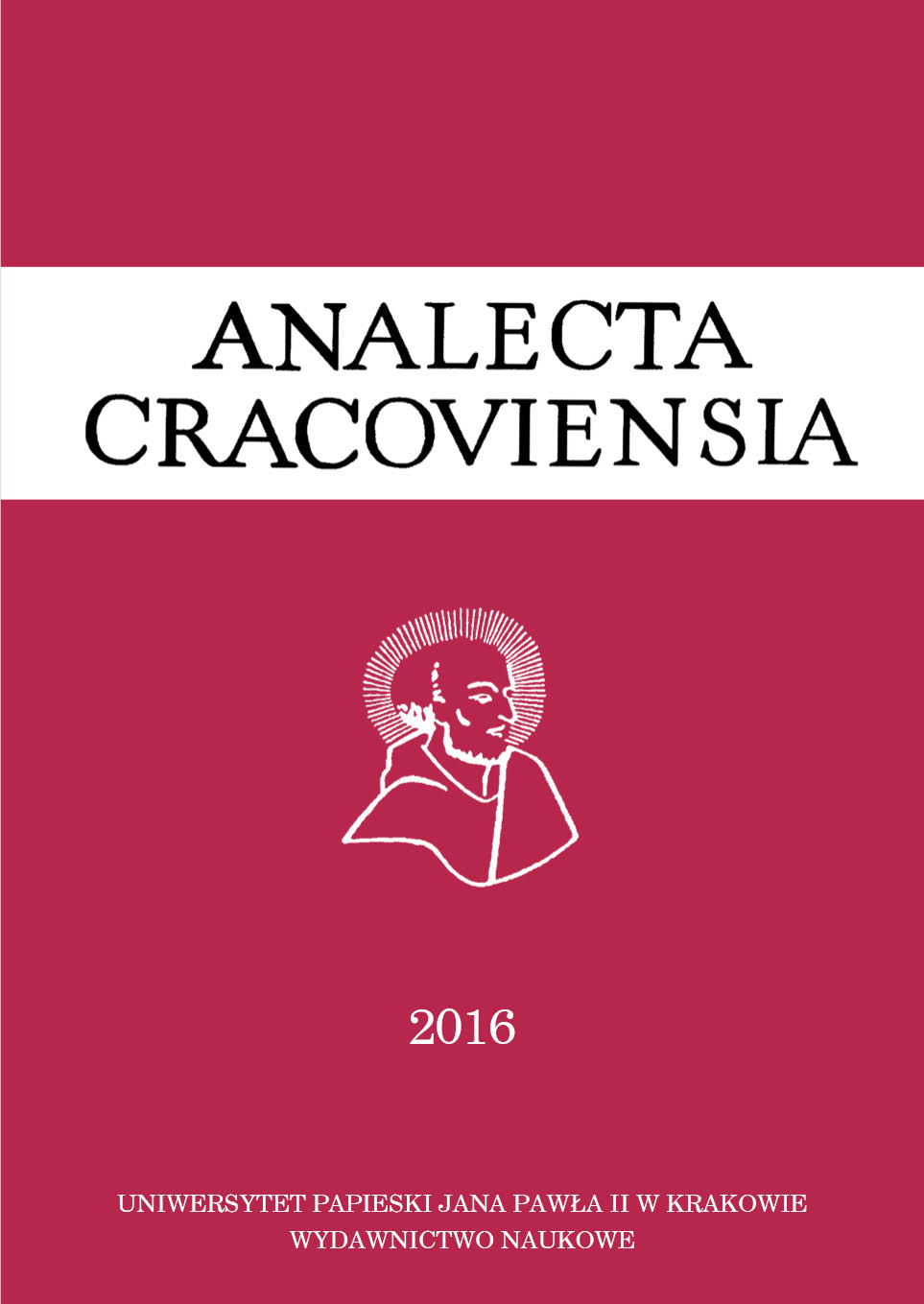Formuły trynitarne we wschodnich i zachodnich modlitwach eucharystycznych
DOI:
https://doi.org/10.15633/acr.2018Słowa kluczowe:
Trójca Przenajświętsza, chrzest, Eucharystia, liturgia, modlitwa eucharystyczna, wyznanie wiaryAbstrakt
Sakramenty chrztu i Eucharystii stanowią centrum liturgii Kościoła, gdyż są uroczystą celebracją tajemnicy wiary oraz wskazują na te treści, które stanowią kluczowy punkt odniesienia dla życia wszystkich wierzących. Fakt ten widać przede wszystkim w tym, że od samego początku istnienia Kościoła obrzędy chrztu i Eucharystii stanowią pierwsze i najważniejsze świadectwo wiary w Trójcę Świętą oraz są wyznaniem tej wiary. Ta ogólna obserwacja wyznacza perspektywę niniejszego studium, w którym pokazujemy, w jaki sposób w liturgii następowała pewna ewolucja wiary w Trójcę Świętą i jak doszło do utrwalenia tej wiary w obecnej liturgii. W niniejszym studium dokonujemy więc przeglądu formuł trynitarnych, które można znaleźć w liturgiach wschodnich i zachodnich, aby pokazać, w jaki sposób wyrażają się w nich treści trynitarne. W odniesieniu do liturgii zachodnich zwracamy szczególną uwagę na liturgię rzymską i liturgię gallikańską, które wyraźnie oddziaływały na siebie w dziejach, a obecna liturgia rzymska jest rezultatem tego oddziaływania. Pośrednim efektem rozwoju formuł trynitarnych oraz pobożności o charakterze trynitarnym jest także liturgiczne święto Trójcy Przenajświętszej, które mimo pewnych początkowych trudności zajęło na trwałe miejsce w liturgii Kościoła. Przeprowadzone analizy pokazują przede wszystkim, że liturgia Kościoła jest ważnym świadectwem wiary trynitarnej oraz szkołą jej przeżywania w kluczu soteriologicznym. Lepsze odczytanie propozycji liturgicznej mogłoby przyczynić się do ożywienia wiary trynitarnej i wydobycia jej znaczenia egzystencjalnego.Bibliografia
Balthasar H. U. von, Modlitwa i kontemplacja, przeł. Z. Włodkowa, Kraków 1965.
Bazyli Wielki, O Duchu Świętym, przeł. A. Brzóstkowska, Warszawa 1999.
Beyga P., Dogmat jako przestrzeń uwielbienia Boga w liturgii na przykładzie prefacji o Trójcy Świętej, „Teologia w Polsce” 10 (2016) nr 1, s. 177–187.
Beyga P., Recenzja, „Teologia w Polsce” 10 (2016) nr 1, s. 273–276.
Boguniowski J. W., Rozwój historyczny ksiąg liturgii rzymskiej do Soboru Trydenckiego i ich recepcja w Polsce, Kraków 2001.
Browe P., Zur Geschichte der Dreifaltigkeitsfestes, „Archiv für Liturgiewissenschaft” 1 (1950), s. 65–81.
Corpus Iuris Canonici, vol. 2, ed. A. Friedberg, Leipzig 1879.
Dalmais I.-H., Les Liturgies d’Orient, Paris 1981.
Galot J., Fêter le Père, Paris 1993.
Giraudo C., Eucaristia per la Chiesa. Prospettive teologiche sull’eucaristia a partire dalla „lex orandi”, Roma–Brescia 1989.
Hamman A.-G., Prières des premiers chrétiens, Paris 1952.
Hymni instaurandi Breviarii Romani, a cura di A. Lentini, Città del Vaticano 1968.
Jungmann J. A., Liturgisches Erbe und pastorale Gegenwart. Studien und Vorträge, Innsbruck–Wien–München 1960.
Jungmann J. A., Die Stellung Christi im liturgischen Gebet, Münster in Westf. 1962.
Jungmann J. A., Missarum solemnia. Eine genetische Erklärung der römischen Messe, Bd. 2, Wien–Freiburg–Basel 1962.
Jungmann J. A., Liturgia pierwotnego Kościoła do czasów Grzegorza Wielkiego, przeł. T. Lubowiecka, Kraków 2013.
Katechizm Kościoła katolickiego, Poznań 2002.
Klaus A., Ursprung und Verbreitung der Dreifaltigkeitsmesse, Werl 1938.
Królikowski J., Tajemnica Trójjedynego. Studia z teologii trynitarnej, Kraków 2015.
Luykx B., Der Ursprung der gleichbleibenden Teile der heiligen Messe, „Liturgie und Mönchtum” 29 (1961), s. 72–119.
McDonald G., Biblical criticism in Early Modern Europe. Erasmus, the Johannine Comma, and Trinitarian debate, Cambridge 2016.
Missale Gallicanum vetus, a cura di L. C. Mohlberg, L. Eizenhöfer, P. Siffrin, Roma 1958.
Missale Gothicum, a cura di L. C. Mohlberg, Roma 1961.
Mszał rzymski z dodaniem nabożeństw nieszpornych, oprac. O. G. Lefebvre, przekład polski opracowali mnisi opactwa w Tyńcu, Tyniec–Bruges [1959].
Neunheuser B., „Cum altari adsistitur semper ad Patrem dirigatur oratio”. Der canon 21 des Konzils von Hippo 393. Seine Bedeutung und Nachwirkung, „Augustinianum” 25 (1985), s. 105–119.
Nadolski B., Leksykon liturgii, Poznań 2006.
Odpowiedź na słowo, wstęp i oprac. H. Pietras, Kraków 1993.
Pierwsi apologeci greccy. Kwadratus, Arystydes z Aten, Aryston z Pelli, Justyn Męczennik, Tacjan Syryjczyk, Milcjades, Apolinary z Hierapolis, Teofil z Antiochii, Hermiasz, przeł., wstęp i komentarze L. Misiarczyk, Kraków 2004.
Paweł VI, Wyznanie wiary Ludu Bożego – Credo Populi Dei, przeł. J. Królikowski, Kraków 2012.
Polemika kluniacko-cysterska z XIII wieku, przeł. E. Buszewicz, red. i wstęp M. T. Gronowski, Kraków 2010.
Prex eucharistica. Textus e variis liturgiis antiquioribus selecti, eds. A. Hänggi, I. Pahl, Fribourg 1968.
Righetti M., Manuale di storia liturgica, vol. 2: L’anno liturgico. Il breviario, Milano 1955.
Roszak P., Mozarabowie i ich liturgia. Chrystologia rytu hiszpańsko-mozarabskiego, Toruń 2015.
Sacramentarium Fuldense saeculi X, eds. G. Richter, A. Schönfelder, Fulda 1912.
Sacramentarium Gelasianum, a cura di L. C. Mohlberg, Roma 1960.
Scientia liturgica. Manuale di Liturgia, vol. 3: L’Eucaristia, direzione di A. J. Chupungo, Casale Monferrato 1998.
Teresa od Jezusa, Dzieła, t. 2, przeł. H. P. Kossowski, Kraków 1987.
The Oxford handbook of the Trinity, eds. G. Emery, M. Levering, Oxford 2011.
Wieczerza mistyczna. Anafory eucharystyczne chrześcijańskiego Wschodu, wybór, wstęp, przeł. i przypisy H. Paprocki, Warszawa 1988.
Pobrania
Opublikowane
Numer
Dział
Licencja
Autorzy publikujący w czasopiśmie udzielają jego wydawcy zgody o następującej treści:
- Autor zachowuje autorskie prawa majątkowe do utworu, a jednocześnie udziela wydawcy czasopisma zgody na jego pierwszą publikację w wersji drukowanej i wersji online na licencji Creative Commons Uznanie autorstwa 4.0 Międzynarodowe oraz zgody na wykonywanie opracowań, w tym przekładów.
- Autor ma możliwość udzielania zgody niewyłącznej na opublikowanie utworu w wersji, która ukazała się w czasopiśmie (np. zamieszczenia go w repozytorium instytucjonalnym lub opublikowania w książce), wraz z informacją o jego pierwszej publikacji w czasopiśmie.
- Autor może umieścić swój utwór online (np. w repozytorium instytucjonalnym lub na swojej stronie internetowej) jeszcze przed zgłoszeniem utworu do czasopisma.

